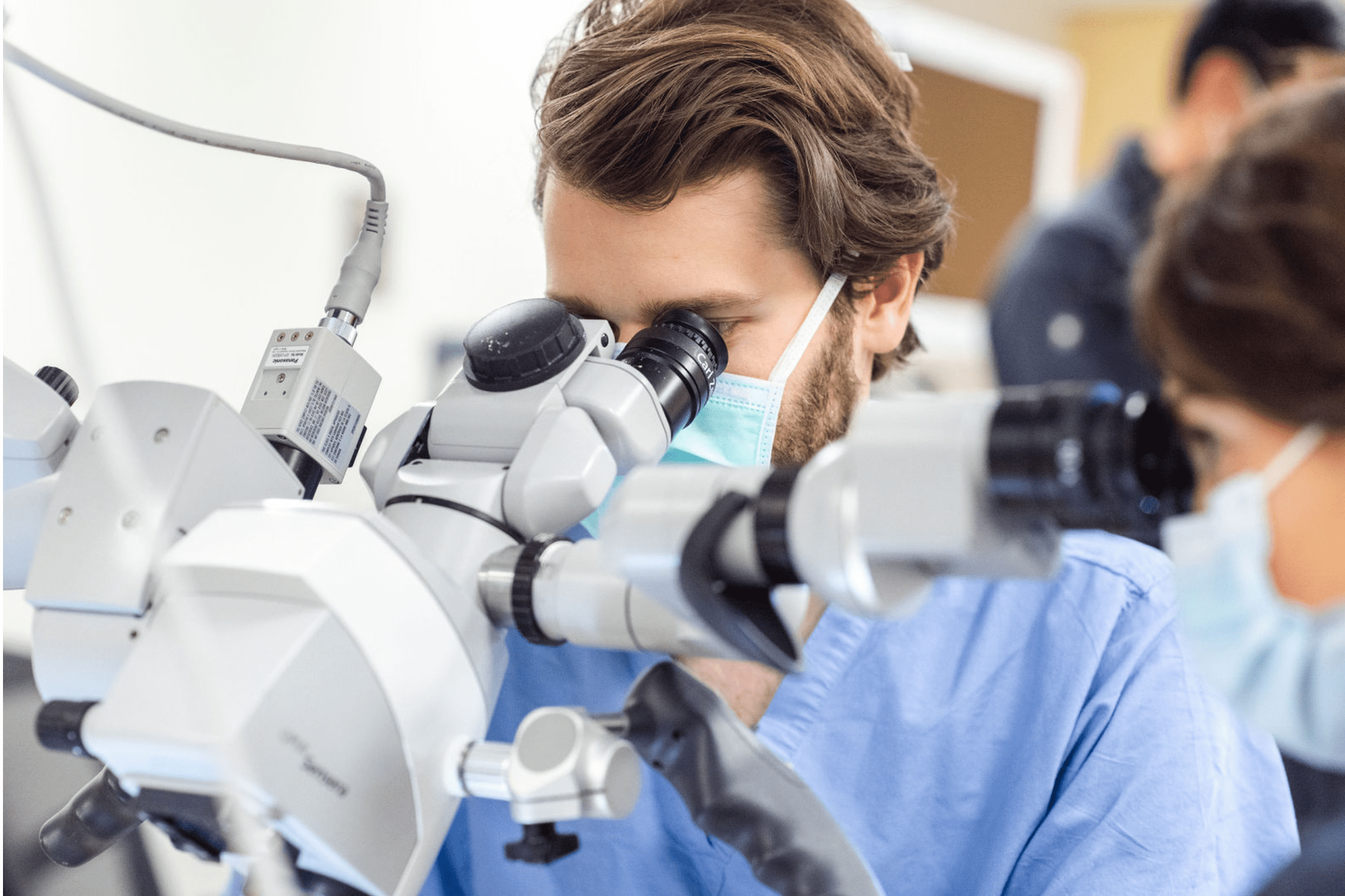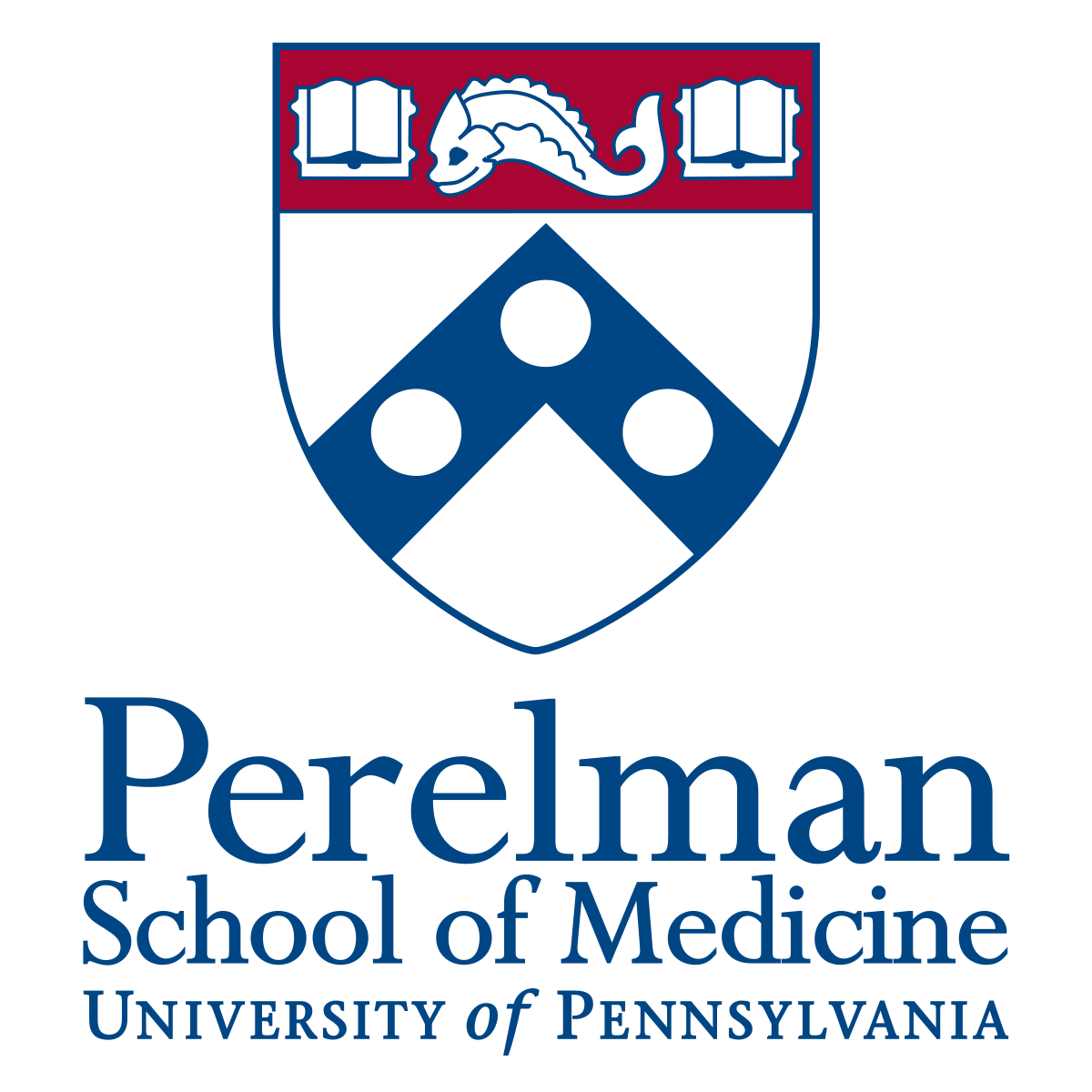PGY-1 to PGY-5
The first year (PGY-1) is spent completing rotations in general surgery, neurosurgery, anesthesia, critical care, oral maxillofacial surgery, and otorhinolaryngology with 3 months at the Hospital of the University of Pennsylvania (HUP) and 3 months at Pennsylvania Hospital (PAH).
The four years of clinical otolaryngology training (PGY-2 to PGY-5) are designed to offer each resident an equivalent experience. Rotations take place at Hospital of the University of Pennsylvania (HUP), Pennsylvania Hospital (PAH), Children’s Hospital of Philadelphia (CHOP), the Philadelphia Veterans Medical Center (VAMC), and Penn Presbyterian Medical Center (PPMC). Each rotation is 10-11 weeks in length. In addition, the PGY-4 residents have a 5 month research rotation.
All aspects of adult and pediatric otolaryngology-head and neck surgery are taught and practiced so as to provide for a well-rounded program. Experience throughout the otolaryngology training program is progressive with increasing clinical and surgical responsibility and autonomy. Each resident within the program has his or her final rotation at each institution in the capacity of chief resident of the service.
PGY-1
HUP – Head and Neck 3 months
PAH – 3 months
SICU, Neurosurgery, Anesthesia, General Surgery (Endocrine/Onc), OMFS – 1 Month each
PGY-2
HUP – Sinus-Otology Junior
HUP – Head and Neck Junior
CHOP – CHOP Junior (2 residents)
VAMC – VA Junior
PGY-3
HUP – Sinus-Otology Junior
PAH – PAH Junior
PPMC – General ENT Resident
HUP and PAH – Surgical float
Enrichment: radiation oncology, radiology, allergy, otology, facial plastics, laryngology, sleep
PGY-4
HUP – Head and Neck Senior
VAMC – VA Chief
Research
Research
CHOP – Chief
PGY-5
HUP – Head and Neck Surgery Chief
HUP – Sinus-Otology Chief
PAH – PAH Chief
PAH – Facial Plastic and Reconstructive Surgery Chief
Capstone – Advanced Subspecialty Elective

Residency Tracks
Physicians are increasingly becoming involved in a wide variety of areas pertaining to the delivery of healthcare that are not directly related to the provision of direct clinical care. We have always considered our department at Penn to be on the leading edge of physician education. As such, we have developed opportunities for our residents to obtain additional exposure and training in a wide variety of areas that are not part of a traditional clinical-training curriculum. These tracks are designed to allow our senior (PGY4 &5) residents to< explore one or more areas that they are interested in or passionate about. They are not compulsory; whether you elect to explore one of these areas of study should depend completely on where your passions lie. We are very excited to offer these options to our residents at present and look forward to expanding the menu of potential tracks in the future.
HEALTHCARE LEADERSHIP IN QUALITY TRACK
| Faculty Mentors: | Karthik Rajasekaran, MD Neha Patel, MD |
| Goals: | The track is a two-year leadership development program that provides residents with hands-on learning in healthcare quality, patient safety, and informatics. Residents are able to receive a certificate from Penn Medicine upon successful completion of the program. |
CURRICULUM
Didactic
Certificate in Healthcare Leadership in Quality
Healthcare Leadership in Quality Residency Track – Penn Medicine
Residents will start off by participating in a 2-week intensive curriculum on topics that include Healthcare Quality and Measures, Patient Safety, Healthcare Equity, Healthcare Informatics, and Healthcare Finance. They will then continue their development by designing a Quality Improvement project, facilitated by their participation in a variety of formal and experiential learning activities.
Clinical
Developing and implanting a QI project.
Education
The resident will present their QI project to the Department during Grand Rounds.
Research
Residents can consider publishing their QI projects when appropriate.
Mentorship
Residents will receive one-on-one mentoring from the Departmental leader and a Penn Medicine executive.
RESIDENT BIOINFORMATICS TRACK
| Faculty Mentors: | Jason Brant, MD |
| Goals: | This track is designed to allow the participant to become familiar with principles and statistical analyses involved in clinical research. Completion of this certificate program should provide participants with the skills to perform systematic reviews, metaanalyses, clinical research study design and analysis. |
CURRICULUM
Didactic
Certificate in Biomedical Informatics
https://www.med.upenn.edu/mbmi/certificate.html
Clinical
n/a
Education
Present Grand Rounds on a systematic review.
Research
Participants will be expected to complete a systematic review or similar project.
Mentorship
The resident will meet with Dr. Jason Brant monthly to review their progress and develop a research project.
GLOBAL HEALTH TRACK
| Faculty Mentors: | Robert Brody, MD |
| Goals: | The Global Health Track provides an opportunity for the resident to gain experience and become a leader in global health delivery related to global otolaryngologic care. Coursework in the “Global Health Track” of UPenn’s Masters in Public Health is available and the resident is encouraged to take 1-2 courses during their residency. The resident is expected to complete a 2 to 4 week global health. This track also provides the opportunity for the resident to speak with mentors about their own leadership style and how to develop into the next generation of leaders in our field. |
CURRICULUM
Didactic
http://www.cphi.upenn.edu/mph/MPHGlobalHealthTrack.html
Clinical
PGY4 Year – 2-4 week international travel providing surgical care
Education
– Present Grand Rounds on a Global Health topic
– Global Health journal club article presentation annually
– Presentation at international meetings encouraged
Research
Research related to global health care delivery and/or disparities is expected. Collaboration with other members of the Penn community through the Center for Global Health (https://www.med.upenn.edu/globalhealth/) or Leonard David Institute (https://ldi.upenn.edu) is encouraged.
Mentorship
The resident will have access to faculty members with varied global health interests. Additional mentorship with surgeons outside of the department through the Center for Surgical Health (https://www.centerforsurgicalhealth.org) is available. The resident will work with Dr. Robert Brody, the Director of the International Visiting Professors Program, to develop relationships with experts across the globe.
RESIDENT HEALTH CARE EQUITY TRACK
| Faculty Mentors: | James Kearney, MD Natasha Mirza, MD |
| Goals: | 1. Develop a knowledge of issues pertaining to Healthcare Equity and delivery of care with a particular emphasis on challenges faced by residents in our South and West Philadelphia neighborhoods that surround our training hospitals. 2. Advance the awareness in our Penn Otorhinolaryngology Department of challenges in providing care to this underserved population. 3. Develop future leaders to bring Healthcare Equity to Otorhinolaryngology and the US Healthcare System. |
CURRICULUM
Didactic
Complete the online curriculum Operation Equity – An Introduction to the Social Determinants of Surgical Health developed by Penn Medicine Center for Surgical health.
Operation Equity | Center Surg. Health (centerforsurgicalhealth.org)
Clinical
Participate as a Resident staff member at the Puentas de Salud Clinic or equivalent clinical exposure to patients who are underserved.
Education
Present Grand Rounds on a Healthcare Equity topic.
Research
Residents are encouraged to submit at least one academic publication on a Healthcare Equity topic.
Leadership
Attend Penn ORL DEI Committee Meetings to represent resident concerns
Apply for membership on AAOHNS Diversity and Inclusion Committee and attend as Visitor if not accepted.
RESIDENT HEALTHCARE LEADERSHIP TRACK
| Faculty Mentors: | Michael Ruckenstein, MD (contact) Greg Farwell, MD Cindy Morgan |
| Goals: | The Leadership Track provides an opportunity for the resident to learn how to become a leader in medicine and to take an online course at Wharton Business School about the changes in healthcare delivery. The course focuses on how healthcare as a business is changing, what physicians can do in the future to adapt, and learn how to manage and lead a team of multidisciplinary members. This track also< provides the opportunity for the resident to speak with mentors about their own leadership style and how to develop into the next generation of leaders in our field. |
CURRICULUM
Didactic
Business of Healthcare Specialization
https://online.wharton.upenn.edu/healthcareadministration-management/
Clinical
n/a
Education
Present Grand Rounds on a Leadership topic.
Research
Residents are encouraged to submit at least one academic publication on a Healthcare Equity topic.
Mentorship
The resident will attend monthly mentorship meetings with leaders in the Health System designated by the PD and by Cynthia Morgan, VP of Learning and Organization Development.
RESIDENT SURGICAL EDUCATION TRACK
| Faculty Mentors: | Tiffany Chao, MD |
| Goals: | The Surgical Education track is designed for residents who want to become leaders in evidence-based surgical teaching, medical education scholarship, and educational innovation. Participants who complete this track will be able to apply adult learning theory to key areas of surgical education including curricular design, assessment and feedback, mentorship, and scholarly program evaluation. |
CURRICULUM
Didactic
Health Professions Education Certificate: https://www.gse.upenn.edu/academics/centerprofessional-learning/health-professions-educationcertificate or Measey Medical Education Fellowship
Clinical
n/a
Education
Participants will develop and implement an otolaryngology educational initiative at the UME or GME level.
Research
Participants will be expected to conduct a research project or scholarly program evaluation based on their proposed educational initiative and submit the results for presentation at a national meeting or for publication in a peer-reviewed journal. Participants will also be expected to attend the annual Society of University Otolaryngologists meeting.
Mentorship
The resident will meet with Dr. Tiffany Chao monthly to review their progress and develop an educational initiative and related scholarship.
